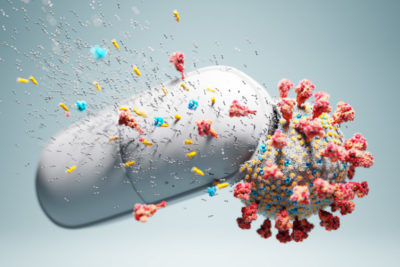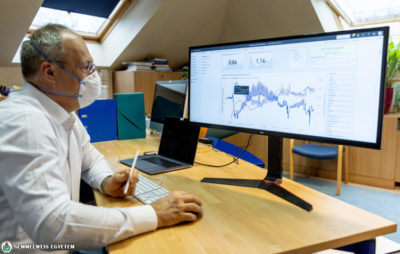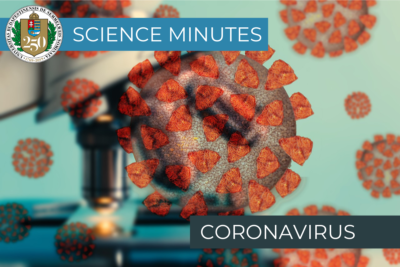Up to date, there is no treatment for COVID-19 approved by the US Food and Drug Administration, however, there are hundreds of studies currently underway all over the world on drugs already authorized and used for different indications and other investigational drugs. Dr. Anett Behon, PhD student gives a comprehensive summary on the drug tests related to the novel coronavirus.
With the rapid spread of the novel coronavirus, also called SARS-CoV-2 (severe acute respiratory syndrome coronavirus 2), the therapeutic options of COVID-19 are receiving more and more attention. However, there is no treatment for COVID-19 approved by the US Food and Drug Administration yet. Currently, hundreds of studies are being conducted on several drugs already approved and used for other indications and on various investigational drugs.
One such agent is remdesivir, an intravenously administered drug with broad antiviral activity that inhibits viral replication through the early termination of RNA transcription. In addition, it has in vitro activity against SARS-CoV-2 and has in vitro and in vivo activity against beta-coronaviruses.
Currently there are four ways for hospitalized patients suffering from COVID-19 and pneumonia to access remdesivir treatment in the United States. An adaptive, double-blind, placebo controlled study and two randomized, open-label, phase III trials provide remdesivir therapy to patients over the age of 18 infected with COVID-19 and suffering from pneumonia with low oxygen saturation. In other areas, however, where there are no clinical trials being conducted related to remdesivir but there is no other therapeutic option for the treatment of patients in severe conditions, it is possible to request remdesivir therapy from the US Food and Drug Administration.
Hydroxychloroquine and chloroquine are two orally administered drugs for other indications which are already in commercial use. Hydroxychloroquine is used to treat various inflammatory diseases, such as rheumatoid arthritis, systemic lupus erythematosus and porphyria cutanea tarda, while chloroquine is the prophylactic and therapeutic agent of malaria.
Both agents have in vitro activity against SARS-CoV, SARS-CoV-2 and other coronaviruses, but activity against SARS-CoV-2 is relatively higher in case of hydroxychloroquine. A Chinese study found that chloroquine treatment of patients suffering from COVID-19 had clinical and virological advantages over the control group, therefore the administration of chloroquine as an antiviral drug is recommended for the treatment of COVID-19 in China. Based on available data, the use of chloroquine and hydroxychloroquine are recommended in several countries for the treatment of hospitalized COVID-19 patients.
Cardiotoxicity (long QT syndrome) is one of the side effects of both drugs, which may cause problems for patients suffering from hepatic or kidney dysfunctions or immunosuppressed patients undergoing long-term treatment. However, available data suggest that patients suffering from COVID-19 have a high tolerance for these drugs.
Due to its higher activity and its broader availability, the use of hydroxychloroquine has been authorized in many countries, including the USA. In a smaller-scale study hydroxychloroquine reduced the presence of SARS-CoV-2 RNA in the upper respiratory tract in only 3-6 days in the majority of the cases. This result is of great importance, as recent studies show that the virus was detectable in Chinese patients for an average of 20 days. When azithromycin was administered as a complementary therapy along with hydroxychloroquine, 100% of the patients were considered cured of the virus on the 6th day of the treatment. Based on these results, the synergistic effect of the combination of hydroxychloroquine and azithromycin has arisen.
Hydroxychloroquine is currently being tested in several studies as a pre-exposure and post-exposure prophylactic agent and as a therapy in cases of mild, moderate and severe COVID-19 infections.
However, at the moment there is no data available from a randomized trial regarding the dosage and time of the administration of hydroxychloroquine as prophylactic or therapeutic agent.
Lopinavir-ritonavir, a drug used in the treatment and prevention of HIV has not proven to be effective in the treatment of COVID-19.
In addition to the current results, there are several other substances being tested worldwide for their potential prophylaxis or therapy of COVID-19.
Dr. Anett Behon, PhD student
Translation: Ágnes Raubinek


